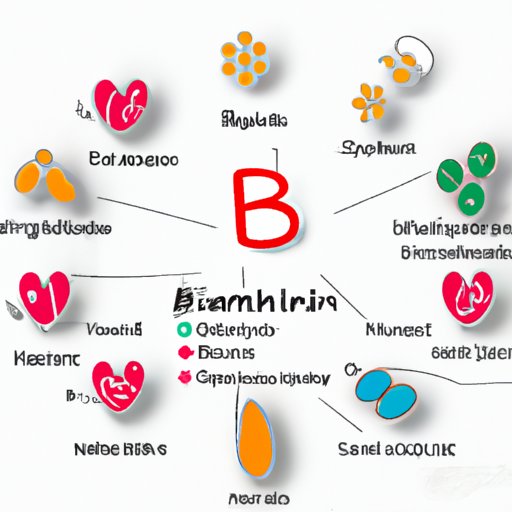
Introduction
Vitamins are essential nutrients that the body needs to function properly. They play a crucial role in maintaining optimal health and wellness. Among the important vitamins that we need to consume on a daily basis is the vitamin B complex. In this article, we will explore the benefits, functions, and food sources of vitamin B complex, and why it’s crucial for the readers to understand them.
The Benefits of Vitamin B Complex: A Comprehensive Guide
Vitamin B complex is a group of eight different B vitamins, including thiamine (B1), riboflavin (B2), niacin (B3), pantothenic acid (B5), pyridoxine (B6), biotin (B7), folate (B9), and cobalamin (B12). Each of these vitamins has a distinct role in our body and is essential for maintaining optimal health and wellness. Vitamin B complex is important for various body functions, including:
- Energy production and metabolism
- Healthy skin, hair, and eyes
- Proper functioning of the nervous and immune systems
- Reducing the risk of certain diseases such as heart disease and birth defects
Several studies have shown that a deficiency in vitamin B complex can lead to serious health problems. For instance:
- Vitamin B1 deficiency is associated with a condition called beriberi, which can cause muscle weakness, pain, and nerve damage.
- Vitamin B6 deficiency can cause skin rashes, anemia, and seizures, while a severe deficiency can lead to nerve damage.
- Vitamin B9 deficiency during pregnancy has been linked to birth defects such as neural tube defects.
The Role of Vitamin B Complex in Promoting Overall Health and Wellness
Vitamin B complex is important for overall health and wellness, and the different types of B vitamins play specific roles in maintaining optimal health. For instance:
- Thiamine (B1) helps convert carbohydrates into energy and is important for nerve function.
- Riboflavin (B2) is involved in energy production, cell growth, and red blood cell formation.
- Niacin (B3) helps convert food into energy and is important for nerve function and healthy skin.
- Pantothenic acid (B5) helps convert food into energy and is involved in hormone synthesis.
- Pyridoxine (B6) is important for red blood cell formation and brain function.
- Biotin (B7) is involved in the metabolism of protein and carbohydrates and is important for healthy skin, hair, and nails.
- Folate (B9) is essential for cell growth and division and is important during pregnancy to prevent birth defects.
- Cobalamin (B12) is important for red blood cell formation and nerve function.
Foods that are high in vitamin B complex include:
- Fortified cereals and whole grains
- Liver and organ meats
- Beans and legumes
- Eggs
- Dairy products
- Leafy greens and vegetables such as asparagus, broccoli, and spinach
Understanding Vitamin B Complex: How It Supports Energy, Metabolism, and More
Vitamin B complex is important for energy production, metabolism, and other bodily functions. Each type of vitamin B complex contributes to these functions in different ways. For instance:
- Thiamine (B1) helps convert carbohydrates into energy by breaking them down into glucose.
- Riboflavin (B2) helps convert food into energy and is important for the metabolism of fats, carbohydrates, and proteins.
- Niacin (B3) helps convert food into energy and plays a role in DNA repair.
- Pantothenic acid (B5) helps break down fats, carbohydrates, and proteins, and is involved in the production of cholesterol and certain hormones.
- Pyridoxine (B6) is involved in the metabolism of amino acids and the production of neurotransmitters that regulate mood and behavior.
- Biotin (B7) helps break down carbohydrates and fats and is important for healthy skin, hair, and nails.
- Folate (B9) helps produce new cells and is important for the growth and development of the fetus during pregnancy.
- Cobalamin (B12) helps produce red blood cells and DNA, and is important for nerve function.
Increasing your intake of vitamin B complex can help improve energy levels and overall health. For instance, taking vitamin B complex supplements has been shown to improve energy levels in people with fatigue and reduce the risk of heart disease in people with high homocysteine levels.
Top 5 Benefits of Vitamin B Complex You Need to Know About
Here are the top 5 benefits of vitamin B complex that you must know:
- Improved energy levels: Vitamin B complex helps convert food into energy and can improve energy levels in individuals with fatigue.
- Healthy skin and hair: Biotin (B7), niacin (B3), and pantothenic acid (B5) are essential for healthy skin, hair, and nails.
- Reduction of stress and anxiety: Pyridoxine (B6) helps produce neurotransmitters that regulate mood and behavior and can reduce stress and anxiety levels.
- Reduced risk of heart disease: Vitamin B complex can reduce the risk of heart disease by lowering homocysteine levels.
- Improved brain function and mental health: Vitamin B complex is important for brain function and can improve mood and cognitive function, reduce the risk of dementia, and lower the risk of depression.
To incorporate more vitamin B complex into your diet, eat a variety of foods that are high in B vitamins. If you are not getting enough vitamin B complex from your diet, you can also take supplements under the guidance of a healthcare professional.
The Importance of Vitamin B Complex for Brain Function and Mental Health
Vitamin B complex is crucial for brain function and mental health. Pyridoxine (B6), in particular, helps produce neurotransmitters that regulate mood and behavior, while folate (B9) is important for the production of serotonin, a neurotransmitter that regulates mood and sleeps cycles. Studies also suggest that increasing your intake of vitamin B complex can reduce the risk of depression, lower the risk of dementia, and improve cognitive function.

Vitamin B Complex and Your Immune System: What You Need to Know
Vitamin B complex is important for immune system function, and deficiencies in vitamin B complex have been linked to a weakened immune system. Vitamin B6, for instance, is important for the production of antibodies that fight off infections, while folate (B9) and cobalamin (B12) are essential for healthy red blood cells and a healthy immune system. Increasing your intake of vitamin B complex can help boost immune system function and prevent and treat certain illnesses.
How to Get Your Daily Dose of Vitamin B Complex and Maintain Optimal Health
To get your daily dose of vitamin B complex and maintain optimal health, follow these tips:
- Eat a variety of foods that are high in B vitamins, including fortified cereals and whole grains, liver and organ meats, beans and legumes, eggs, dairy products, and leafy greens and vegetables such as asparagus, broccoli, and spinach.
- Supplement your diet with vitamin B complex supplements under the guidance of a healthcare professional if you are not getting enough from your diet.
- Maintain a balanced diet and lifestyle to promote overall health and wellness.
- Speak with a healthcare professional before making any major dietary changes.
Conclusion
Vitamin B complex plays a crucial role in maintaining optimal health and wellness. A deficiency in vitamin B complex can lead to serious health problems, so it’s important to understand the benefits, functions, and food sources of vitamin B complex. By incorporating more vitamin B complex into your diet and maintaining a balanced lifestyle, you can boost immune system function, improve energy levels, promote healthy skin and hair, reduce stress and anxiety, and improve brain function and mental health.





